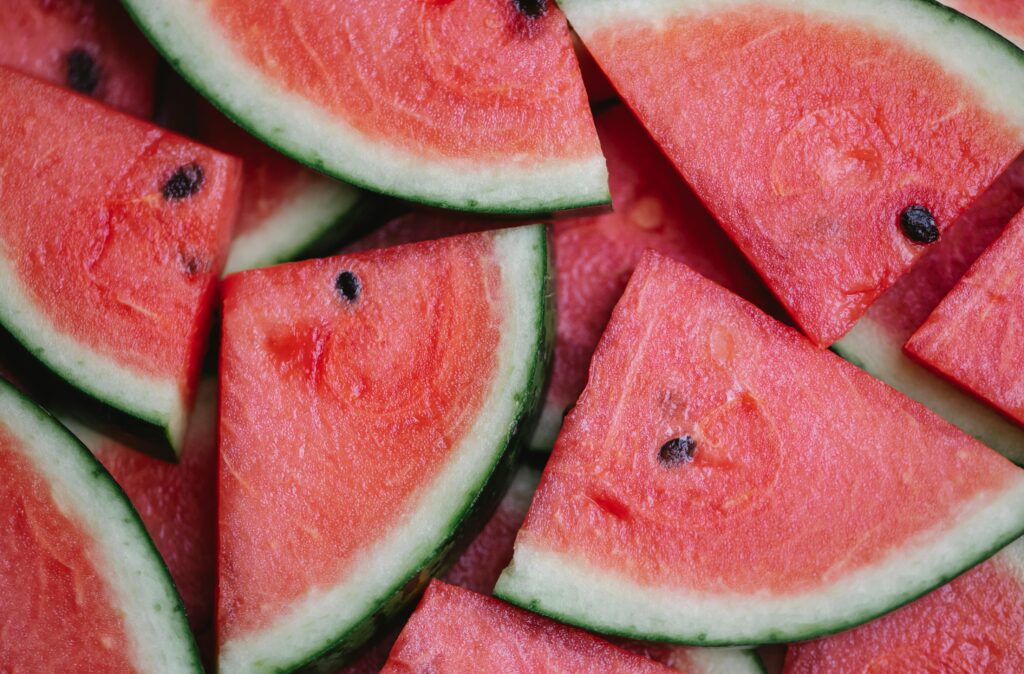Health Benefits of Watermelon

Health Benefits of Watermelon
Watermelon is a delicious and refreshing fruit that is especially popular during the summer. Composed of over 90% water, it helps keep the body hydrated and provides a range of essential nutrients. This colorful fruit is not only sweet and juicy but also packed with powerful antioxidants, vitamins, and minerals that promote good health. In this article, we’ll explore the top health benefits of watermelon in about 700 words.
- Excellent Source of Hydration
Watermelon is made up of approximately 92% water, making it one of the best fruits for staying hydrated. Proper hydration is essential for all bodily functions, including circulation, digestion, and temperature regulation. Eating watermelon, especially in hot climates, helps prevent dehydration and replenishes lost fluids. - Rich in Nutrients and Low in Calories
Despite being low in calories (about 46 calories per cup), watermelon is loaded with important nutrients. It is a good source of:
Vitamin C – boosts immunity and helps in skin repair.
Vitamin A – supports eye health and skin.
Vitamin B6 – helps the body break down protein and maintain brain function.
Potassium – important for heart and muscle function.
Magnesium – helps in muscle and nerve function.
- Contains Powerful Antioxidants
Watermelon is rich in antioxidants, such as:
Lycopene – a red pigment and powerful antioxidant that helps reduce the risk of heart disease and some cancers. It also protects the skin from sun damage.
Vitamin C – neutralizes free radicals and supports the immune system.
Beta-carotene – converts to vitamin A in the body and protects cells from damage.
These antioxidants help combat oxidative stress and inflammation in the body.
- Supports Heart Health
Watermelon is heart-friendly. The lycopene found in it has been linked to lower cholesterol levels and reduced blood pressure. In addition, citrulline, an amino acid in watermelon, helps improve blood flow and may reduce blood pressure. The potassium content also helps regulate heartbeat and muscle contractions, lowering the risk of heart disease. - May Improve Digestion
Because of its high water content and small amount of dietary fiber, watermelon supports smooth digestion. Eating it can help prevent constipation and promote regular bowel movements. It also helps maintain a healthy gut by keeping the digestive tract lubricated and functioning properly. - Supports Skin and Hair Health
Watermelon contains vitamin C, which is essential for collagen production – a protein that keeps skin firm and young-looking. It also contains vitamin A, which helps repair skin cells and keeps the skin moisturized. The lycopene and beta-carotene help protect the skin against damage from UV rays, reducing the effects of aging. - Good for Eye Health
Watermelon is a good source of vitamin A and beta-carotene, which are important for eye health. These nutrients help protect the retina, support good vision, and may reduce the risk of age-related macular degeneration. - Helps with Muscle Soreness
Some athletes drink watermelon juice to reduce muscle soreness after workouts. The amino acid citrulline found in watermelon improves circulation and reduces the build-up of lactic acid in muscles. This can help improve recovery time and decrease post-exercise discomfort. - May Aid in Weight Management
Because watermelon is low in calories and high in water, it makes a great snack for those trying to lose weight or maintain a healthy weight. It fills you up without adding many calories and satisfies sugar cravings naturally. - May Help Reduce Inflammation
Chronic inflammation is linked to many diseases, including arthritis, diabetes, and cancer. Watermelon contains anti-inflammatory compounds like lycopene and vitamin C, which may help reduce inflammation and oxidative damage in the body.
How to Enjoy Watermelon
Watermelon can be eaten fresh, in fruit salads, smoothies, or even grilled. Watermelon juice is another refreshing way to enjoy its health benefits. Make sure to consume it in moderation, especially if you are managing blood sugar levels, as it contains natural sugars.
Conclusion
Watermelon is not only a delicious fruit but also a nutritional powerhouse. It hydrates, protects the heart, supports digestion, boosts immunity, and helps keep skin healthy. Including watermelon in your diet, especially during the hot season, is a tasty and effective way to promote good health.
ChatGPT can make mista





